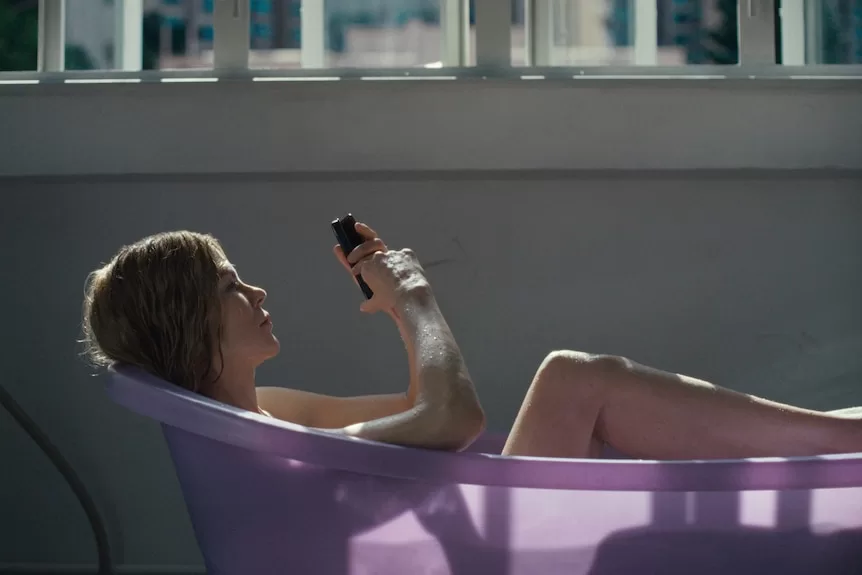In Lulu Wang and Nicole Kidman’s new miniseries, Hong Kong is a city that alternately haunts, delights and humbles its wayward residents.
A street lamp somewhere is always casting jaundiced beams into shoebox bedrooms and palatial apartments alike, illuminating the foibles and follies of their occupants with an unsparing eye.
When a typhoon swirls in the series’ penultimate instalment — a feature-length epic titled Central and the crown jewel in Expats’ six-episode run — it feels nothing short of biblical.
Freighted with the history of all of cinema’s classic deluges — say, the blinding cloudburst of Bong Joon-ho’s much-loved Parasite, or the froggy downpour of Paul Thomas Anderson’s Magnolia — the typhoon in Expats is menacing and purifying in equal measure.
It punctures the hermetic security of the city’s wealthiest, whose high-rise abodes — unfailingly staffed by an underclass of live-in domestic “helpers”, as they’re euphemistically known — are suddenly besieged by blackouts and leaks.
For others, the storm severs the monotony of urban life. It is a glimpse of fantasy; a chance to surrender any mortal woes to the firmament overhead.
Above all, the rain in Expats is a purge, flushing long-held resentments and covert affairs out into the open. Hong Kong, as multiple characters caution throughout the series, is small. Nothing can stay hidden for long.
And there are secrets aplenty in this series: a sinuous, often stirring adaptation of American author Janice Y. K. Lee’s 2016 novel The Expatriates.
Lee’s book tends towards a class satire of the mannered foreigners who work and frolic across their own artificial versions of Hong Kong. Wang strengthens the narrative’s emotional heft.
Expats is the story of a trio of American women, each of them indelibly marked by a tragedy in the recent past whose backstory takes the better part of two episodes to unfold.
At the centre is Kidman’s Margaret, whose swanky lifestyle with her husband is brought to a screeching halt when her youngest son Gus goes missing in a night-time market.
Flinty and falsely composed, Margaret is Kidman’s prototypical character, recalling everything from her Oscar-nominated turn as a grieving mother in 2010’s Rabbit Hole, to her lovelorn widow in 2004’s Birth.
Kidman, here, is note-perfect, her steely resolve belying her manic desperation in the increasingly futile search for her son.
Hilary (Sarayu Blue) is Margaret’s downstairs neighbour and one-time confidante, though their friendship has waned in the fallout of Gus’s disappearance.
Twenty-something Mercy (newcomer Ji-young Yoo), meanwhile, was Gus’s babysitter on the night he vanished. She is spiky, defiant — though her demeanour barely conceals a deep well of guilt.
“People like me,” she intones in Expats’ opening minutes. “Are they ever forgiven?”
Hong Kong, to all three women, holds an almost mystical appeal. They were lured here by love, money, or the promise of escapism, and each remains steadfastly bound to the city despite the aftershocks of tragedy.
As in her breakout film The Farewell — about an American woman journeying back to China for one last visit with her dying grandmother — Wang helms Expats with a masterful delicacy.
A morass of existential quandaries bubbles beneath the series: the stark class disparities of contemporary Hong Kong; the violence and anguish of motherhood; the pain and privilege of immigration.
In the distance, the city’s 2014 Umbrella Revolution begins to stir.
Wang, however, never exploits these themes for entertainment. Expats could’ve easily imitated the gossipy thrills of fellow Kidman production Big Little Lies, or the eat-the-rich antics of The White Lotus, yet Wang imparts a singularly observational tone to her production.
It’s when she turns her camera away from the main cast and towards the domestic staff propping up their lives that the magic of Expats reveals itself.
Towards the end of the series, we catch a simple shot of one of the helpers (Amelyn Pardenilla) on her single day off, rehearsing a song with her choir in a public square.
The song is Katy Perry’s Roar; she beams, voice soaring to the heavens. It feels like clouds parting, a storm breaking — a brief second of clarity amidst the turmoil.
Expats is streaming on Prime Video.
